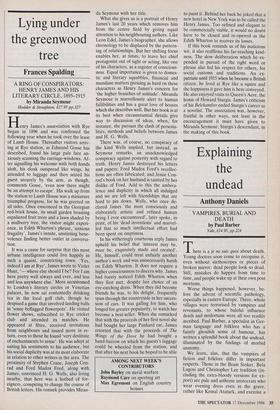Lying under the greenwood tree
Frances Spalding
A RING OF CONSPIRATORS: HENRY JAMES AND HIS LITERARY CIRCLE, 1895-1915 by Miranda Seymour
Hodder & Stoughton, £17.95 pp.327
Henry James's asssociation with Rye began in 1896 and was confirmed the following year when he took over the lease of Lamb House. Thereafter visitors arriv- ing at Rye station, as Edmund Gosse has described, found his large pale face an- xiously scanning the carriage-windows. Af- ter signalling his welcome with both hands aloft, his cloak outspread like wings, he attended to luggage and then seized his guest securely by the arm, as though, comments Gosse, 'even now there might be an attempt to escape'. His walk up from the station to Lamb House was a miniature triumphal progress, for he was greeted on all sides. Once ensconced in the Georgian red-brick house, its small garden boasting espaliered fruit trees and a lawn shaded by a mulberry tree, the visitor might experi- ence, in Edith Wharton's phrase, 'anxious frugality', James's innate, unstinting bene- volence finding better outlet in conversa- tion.
It was a cause for surprise that this most urbane intelligence could live happily in such a quaint, constricting town. 'Yes, indeed I am at Rye', James wrote to Violet Hunt, `— where else should I be? For I am here pretty well always and ever, and less and less anywhere else.' More accustomed to London's literary 'circles or Venetian palaces, he now sat contentedly drinking tea in the local golf club, though he despised a game that involyed landing balls in 'some beflagged flowerpots'. He visited flower shows, subscribed to Rye cricket club and attended its matches. He appeared at fetes, received invitations from neighbours and issued more in re- turn, even to those he found 'very destitute of enchantments to sense'. He was adept at suiting his sentiments to his audience, but his social duplicity was at its most elaborate in relation to other writers in the area. The proximity of Stephen Crane, Joseph Con- rad and Ford Madox Ford, along with James, convinced H. G. Wells, also living nearby, that here was a hotbed of for- eigners, conspiring to change the course of British letters. His remark provides Miran- da Seymour with her title.
What she gives us is a portrait of Henry James's last 20 years which removes him from the centre field by giving equal attention to his neighbouring authors. Like Leon Edel, James's biographer, she allows chronology to be displaced by the pattern- ing of relationships. But her shifting focus enables her, at times, to leave her chief protagonist out of sight or acting, like one of his characters, as a register of conscious- ness. Equal importance is given to domes- tic and literary squabbles, financial and mundane matters pressing as hard on these characters as Henry James's concern for 'the higher branches of solitude'. Miranda Seymour is marvellously alert to human fallibilities and has a great love of houses which she describes well. But her book is at its best when circumstantial details give way to discussion of ideas, when, for instance, she pursues the clash of persona- lities, methods and beliefs between James and H. G. Wells.
There was, of course, no conspiracy of the kind Wells implied, but instead, as Seymour remarks, an unacknowledged conspiracy against posterity with regard to truth. Henry James destroyed his letters and papers; Ford Madox Ford's recollec- tions are often fabricated; and Jessie Con- rad's book on her husband is tainted by her dislike of Ford. Add to this the ambiva- lence and duplicity in which all indulged and we are left with friendships that are hard to pin down. Wells, who once de- clared James 'the most consciously and elaborately artistic and refined human being I ever encountered', later spoke, in print, of his 'dead inventions' and marvel- led that so much intellectual effort had been spent on emptiness.
In his witheringly courteous reply James upheld his belief that 'interest may be, must be, exquisitely made and created'. He, himself, could treat unfairly another author's work and was unnecessarily harsh on Edith Wharton. It does not require a higher consciousness to discern why. James had barely noticed Edith :Wharton when they first met, despite her choice of an eye-catching dress. When they did become friends he was, to his delight, frequently spun through the countryside in her succes- sion of cars. It was galling for him, who longed for greater popularity, to watch her become a best-seller. When she remarked that with the proceeds of her first novel she had bought her large Panhard car, James retorted that with the proceeds of The Wings of the Dove he had bought a hand-barrow on which his guests's luggage could be wheeled from the station, and that after his next book he hoped to be able to paint it. Behind her back he joked that a new hotel in New York was to be called the Henry James. Too refined and elegant to be commercially viable, it would no doubt have to be closed and re-opened as the Edith Wharton to recover its losses.
If this book reminds us of his malicious wit, it also reaffirms his far-reaching kind- ness. The slow deliberation which he ex- pended in pursuit of the right word or phrase also fed his respect for others, for social customs and traditions. An ex- patriate until 1915 when he became a British citizen, he lived at Rye like a squire and the happiness it gave him is here conveyed. He also enjoyed visits to Queen's Acre, the home of Howard Sturgis. James's criticism of his Belchamber ended Sturgis's career as a novelist. The association was, however, fruitful in other ways, not least in the encouragement it must have given to Miranda Seymour, Sturgis's descendant, in the making of this book.


























































 Previous page
Previous page